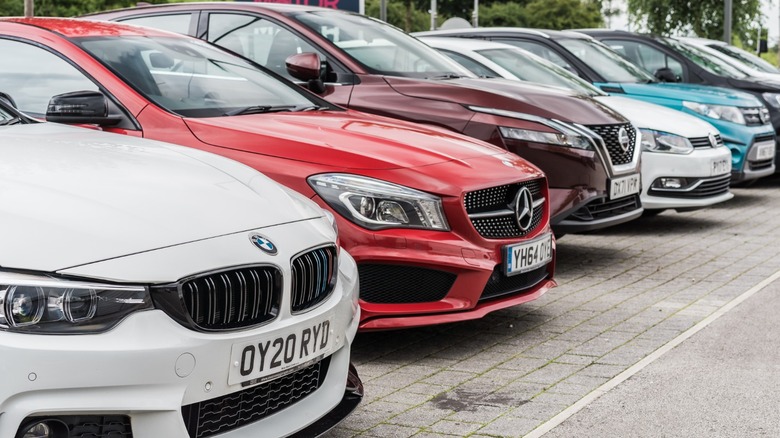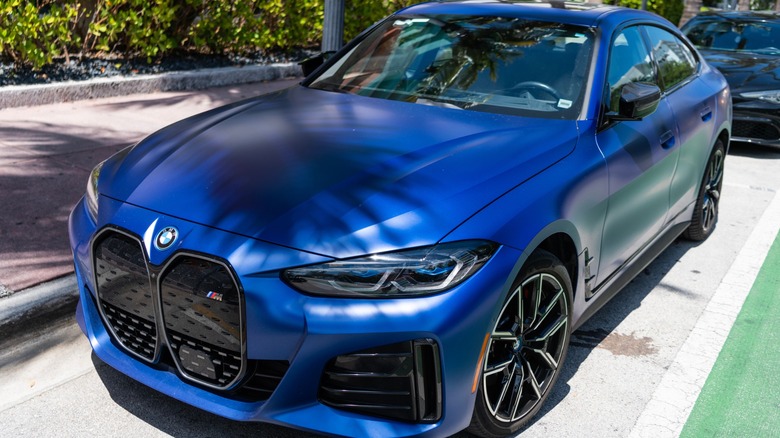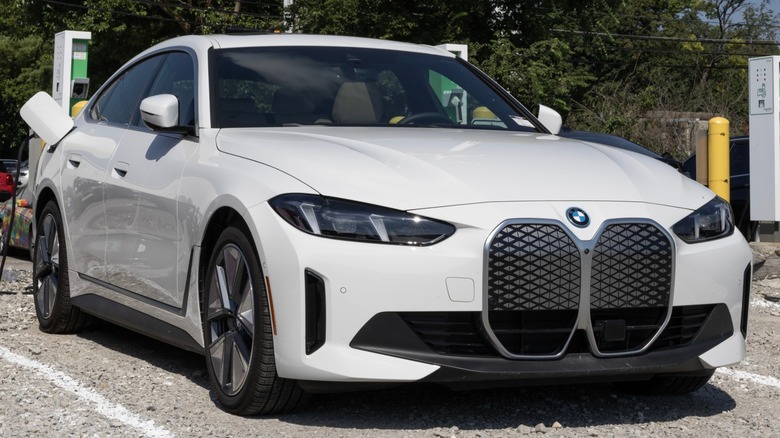Consumer Reports Says This Best-Selling EV Is One Of The Most Reliable Cars
Reliability has and always will be a key metric for buying any car, regardless of what you plan to use it for. But when you add "EV" into the equation, you could end up with a vehicle with a strong value proposition. As the electric car industry continues to optimize and get better, EVs have become the true money-saving choice, especially if home charging is an option for you. If you've been avoiding electric cars because none of the reliable ones come in the exciting and luxurious German package, then Consumer Reports presents you with the BMW i4.
Drawing from its robust pool of surveys and test results, Consumer Reports published its list of the 10 most reliable cars, and the BMW i4 2025 had an aggregated reliability score of 82 (the highest-ranking car scored 86). This number placed it above the Hyundai Elantra Hybrid, the Lexus NX, the Lexus NX Hybrid, and the Toyota Corolla Hybrid. What's extra impressive is that it's the only fully electric vehicle on the list, making it perhaps the most reliable EV of 2025 with no competitor in sight.
What makes the BMW i4 so reliable?
The BMW i4 is similar to the Ford F-150 Lightning in the sense that it's the electric twin of an established and historically reliable best-selling platform. But that's about all the similarities, because while the electric F-150 has poor reliability scores from Consumer Reports, the BMW i4 is pleasing reviewers and owners alike. Additionally, unlike the F-150 Lightning, where Ford only used the same aluminum cab but built a new frame, the i4 uses the same body shell and architecture, just swapped for an EV setup and EV-specific chassis bits. This adds to its reliability, since you aren't dealing with a first-year, ground-up experiment — less risk and room for failure.
Externally, the 2025 i4 is also doing well, since it has had only one NHTSA recall for software-related loss of drive power. One recall may be an eyebrow-raiser, but when you compare it to the multiple that the Tesla Model 3 and the Mercedes-Benz EQE have received, you'll see that it's not such a bad number. Consumer Reports says that the 2025 BMW i4 will be "much more reliable than the average new car," and this is based on these NHTSA recalls and repair data from 2023 to 2024 i4s plus BMW's brand track record.
However, apart from the recall, CR had to deduct points for its rating because the touchscreen infotainment and climate control systems aren't as smooth as they could be. Beware of that if you plan to get this car.
Is the BMW i4 worth its price?
The MSRP for the 2025 i4 ranges from $59,075 to $71,875, according to Cars.com. Comparing those figures against the i4's primary competitors, like the 2025 models of the Tesla Model 3, Polestar 2, and Mercedes-Benz EQE, puts the value and tradeoffs into context. For instance, the Mercedes EQE starts in the $77,000 to $95,000 range, which is pricier than the top-tier all-wheel drive (AWD) i4 M50 at $71,875 but won't offer the same reliability and arguably has worse sports car performance, according to Car and Driver's tests. Albeit, you'd be getting a more "luxurious" interior with the EQE.
A Tesla Model 3 would have been a good low-cost alternative if it met the i4's reliability benchmark. The Model 3's prices range from the low-mid $40Ks and top out around $56.6K for the Performance trim, which is even cheaper than the i4's cheapest rear-wheel drive trim. It's not bad in terms of performance, but its spartan, screen-based, non-luxury interior makes it a poor replacement, which is why it ranks among the worst cars retirees can buy.
Where the BMW i4 sits comfortably is at the Polestar 2's price point. The Polestar 2 has only one performance-oriented trim at around $64,800 (around the same as the AWD i4 xDrive40), but that's also lacking a CR-backed reliability guarantee. However, that proves that the BMW is price-competitive in the luxury EV category and not particularly overpriced.


